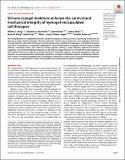Silicone cryogel skeletons enhance the survival and mechanical integrity of hydrogel-encapsulated cell therapies
Author(s)
Jeang, William J; Bochenek, Matthew A; Bose, Suman; Zhao, Yichao; Wong, Bryan M; Yang, Jiawei; Jiang, Alexis L; Langer, Robert; Anderson, Daniel G; ... Show more Show less
DownloadPublished version (17.44Mb)
Publisher with Creative Commons License
Publisher with Creative Commons License
Creative Commons Attribution
Terms of use
Metadata
Show full item recordAbstract
The transplantation of engineered cells that secrete therapeutic proteins presents a promising method for addressing a range of chronic diseases. However, hydrogels used to encase and protect non-autologous cells from immune rejection often suffer from poor mechanical properties, insufficient oxygenation, and fibrotic encapsulation. Here, we introduce a composite encapsulation system comprising an oxygen-permeable silicone cryogel skeleton, a hydrogel matrix, and a fibrosis-resistant polymer coating. Cryogel skeletons enhance the fracture toughness of conventional alginate hydrogels by 23-fold and oxygen diffusion by 2.8-fold, effectively mitigating both implant fracture and hypoxia of encapsulated cells. Composite implants containing xenogeneic cells engineered to secrete erythropoietin significantly outperform unsupported alginate implants in therapeutic delivery over 8 weeks in immunocompetent mice. By improving mechanical resiliency and sustaining denser cell populations, silicone cryogel skeletons enable more durable and miniaturized therapeutic implants.
Date issued
2024-04-05Department
Massachusetts Institute of Technology. Department of Materials Science and Engineering; Koch Institute for Integrative Cancer Research at MIT; Massachusetts Institute of Technology. Department of Chemical Engineering; Massachusetts Institute of Technology. Department of Biological Engineering; Massachusetts Institute of Technology. Institute for Medical Engineering & Science; Harvard University--MIT Division of Health Sciences and TechnologyJournal
Science Advances
Publisher
American Association for the Advancement of Science
Citation
William J. Jeang et al. ,Silicone cryogel skeletons enhance the survival and mechanical integrity of hydrogel-encapsulated cell therapies.Sci. Adv.10,eadk5949(2024).
Version: Final published version